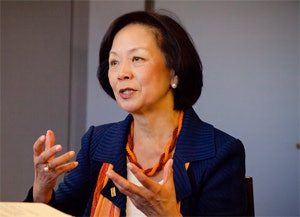 Chancellor Phyllis Wise became at least the sixth top administrator to resign from the university under difficult circumstances since 2009
Chancellor Phyllis Wise became at least the sixth top administrator to resign from the university under difficult circumstances since 2009CHAMPAIGN, Ill. —The resignation of the top administrator at the University of Illinois’ flagship campus is following a familiar script: Step down under pressure, take a year off with pay, then return as one of the highest-paid members of the faculty.
Chancellor Phyllis Wise became at least the sixth top administrator to resign from the university under difficult circumstances since 2009. Five have or are expected to return after a year’s paid leave to high-paying campus jobs that wouldn’t otherwise exist, while a sixth who announced his resignation this week will rejoin the faculty at the end of the month.
The soft, lucrative landings into positions that often come with salaries of $200,000 a year or more are guaranteed by contracts commonly given to high-level administrators at many schools. Some experts say they’re necessary to persuade qualified people to take jobs that, as the University of Illinois demonstrates, can be demanding and end badly.
“That is a product of the marketplace,” said Jack Schuster, a professor of education and public policy at Claremont Graduate University in California. “The about-to-be-appointed chief executive officer of a campus, understanding the risks he or she will be taking on in any kind of volatile situation, finds (it) as a necessary inducement to take that risk.”
Other schools provide similar deals. Colorado State University President Tony Frank can leave his job and become a faculty member at $208,000 a year. And at California State University, a year off with pay is common for top administrators before they take up faculty jobs, a practice that has drawn criticism from other professors.
At Illinois, the contracts for just four of the administrators will cost the public university $1.3 million next school year. But given likely funding cuts as the state deals with a huge budget deficit, University President Timothy Killeen told The Associated Press on Wednesday that the school needs to study potential changes in future contracts.
“We are rethinking our overall administrative cost structure in the context of the state’s fiscal situation and in the spirit of our commitment to making continuous improvements in effectiveness and efficiency without compromising excellence,” he said in an email. “Contractual terms and obligations for key administrators, including provision of incentives and separation aspects, will all be part of this analysis.”
Killeen’s own contract, approved this year, guarantees him a job as a tenured professor of electrical and computer engineering at a salary equal to the average of the 10 highest in the university, excluding medical and dentistry professors.
Wise’s resignation came after the university revealed more than 1,000 pages of emails in which she and others used personal email accounts to discuss university business. While that’s permitted, those emails were not provided in response to subsequent public requests for such emails made under the Freedom of Information Act.
She will not receive a $400,000 bonus due under her contract, after Gov. Bruce Rauner and other politicians complained. But as a professor of molecular and cellular biology, she will earn $298,926—more than twice what the average University of Illinois professor was paid last year.
“I don’t think that the super-cushy golden parachute positions make sense. It doesn’t look good, and it doesn’t send a good message,” said Lennard Davis, an English professor at the University of Illinois-Chicago and member of that campus’ union bargaining committee. “The university needs to be aware of what it looks like to give these kinds of fat-cat (contracts) in a time of economic crisis.”
Those kinds of moves by top University of Illinois officials in recent years include the resignations of both President Joseph White and Urbana-Champaign Chancellor Richard Herman during an admissions scandal. Herman retired this summer but had been making $200,000 a year. The others remain on the payroll, at salaries ranging from $295,180 to $380,000.
For administrators, returning to the faculty means they teach—though their class loads vary and can include semesters off—conduct research and, in some cases, take on other duties. White, for instance, has been involved in the planning for a new medical school.
State Sen. Chapin Rose, a Republican and a University of Illinois graduate, says he isn’t necessarily bothered by the guarantee of high salaries for administrators who were forced out, but they need to do more than just teach a class or two and their contracts should stipulate what is expected.
“Phyllis (Wise) was a recognized scientist. She could bring in research grants that might justify that salary,” Rose said.





















